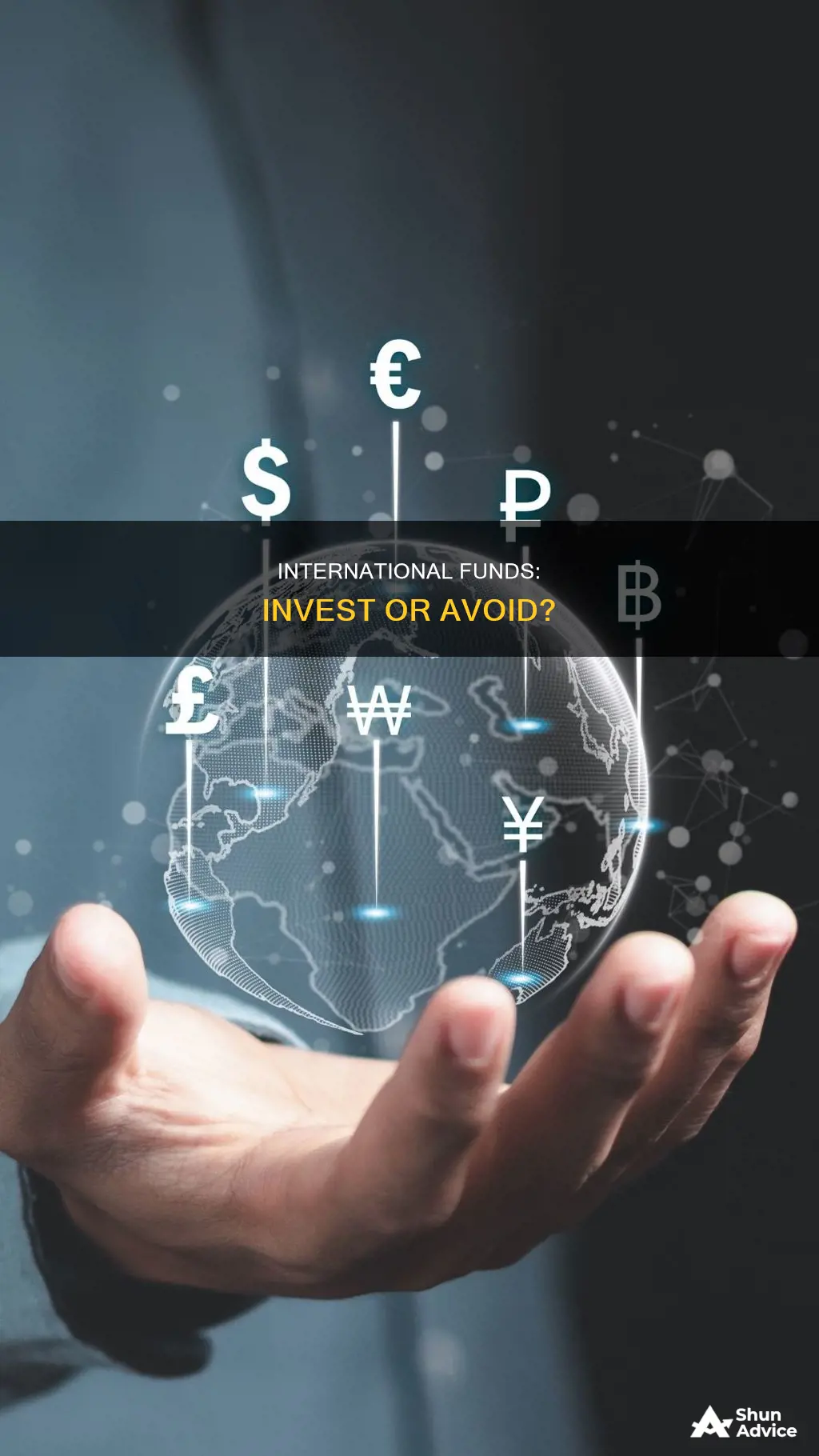
Investing in international funds can be a great way to diversify your portfolio and reduce risk. By investing in companies outside of your home country, you can tap into growth in economies beyond your own and take advantage of different risk/return patterns. International funds can also provide a hedge against currency risk and geopolitical risks. However, investing in international funds carries its own set of risks, including currency fluctuations, political and economic instability, and reduced liquidity in foreign markets. It's important to carefully consider these risks and do your research before investing.
What You'll Learn

Diversification and risk reduction
Diversification is crucial for long-term investors as it reduces risk. International diversification is key, as enduring a decade of flat returns is challenging for any investor. Having stocks from outside the U.S. can help buffer against potential stagnation and potentially reap above-average returns.
International stocks can help diversify your portfolio and hedge against risk. By investing in a different country's companies, you are almost by default investing in another currency, which can be a double-edged sword. When the U.S. dollar weakens, international holdings can provide a hedge, but if it strengthens, the investor's international stock could underperform.
Markets outside the U.S. don't always rise and fall simultaneously with the domestic market, so owning a mix of international and domestic securities can smooth out some of the volatility in your portfolio. This can spread out your portfolio's risk more effectively than if you only owned domestic securities.
Vanguard recommends that at least 20% of your overall portfolio should be invested in international stocks and bonds. To get the full diversification benefits, consider investing about 40% of your stock allocation in international stocks and about 30% of your bond allocation in international bonds.
International diversification can be achieved through mutual funds and exchange-traded funds (ETFs), which are a straightforward alternative to dealing with American depositary receipts (ADRs) or currency conversions.
There are several advantages to investing in international and global stock funds:
- They can offer investors multiple layers of diversification, including geographical, currency, and sector diversification, reducing the chances that the performance of a single stock or instability in a single country can negatively impact the entire portfolio.
- They have the potential to offer greater capital appreciation than domestic stock funds, although this comes with greater risk.
- They may offer a broader variety of income sources when compared to investing solely in U.S. stocks.
- They are professionally managed, with portfolio managers and analysts having the expertise, technology, global reach, and language skills needed to research companies and analyze market information before making investment decisions.
Spotting Junk Bond Funds: What Investors Should Know
You may want to see also

Currency risk
For example, if the US dollar strengthens against other currencies, the value of an international stock holding may be negatively impacted, as it will now be worth less in US dollars. On the other hand, if the dollar weakens, international holdings can provide a hedge, as the value of the investment will increase in US dollar terms.
To mitigate currency risk, investors can consider international investments hedged in US dollars or investing in companies in countries with currencies that are appreciating against the US dollar. Additionally, investing in a mix of international and domestic securities can help to reduce overall portfolio volatility.
Upstox Mutual Funds: A Step-by-Step Guide to Investing
You may want to see also

Geopolitical advantages
Geopolitical risks have become a pressing concern for institutional investors. While some investors believe they are capable of analysing and managing such risks, many public investors are unprepared and lack the proper frameworks and expertise to tackle them in a structured and rigorous way.
Geopolitical risks can impact all investments across regions, sectors and industries. They refer to the potential for political, social, economic, or military conflicts to disrupt financial markets or affect the performance of investments. These risks can arise from wars, political instability, trade disputes, terrorism, and regulatory changes, among other issues.
- Diversification: Geopolitical risks can be mitigated by diversifying investments across different asset classes, industries, and regions. By spreading investments globally, investors can reduce their exposure to specific geopolitical risks and protect their portfolios from market volatility.
- Safe-haven assets: Gold is often referred to as a safe-haven asset during times of geopolitical turmoil. Investors tend to buy gold as it is seen as a tangible, recession-proof asset that holds its value. Other commodities like precious metals, energy, and agricultural products can also be considered safe investments during uncertain times.
- Currency considerations: Currency fluctuations are an important factor to monitor during geopolitical tensions. For example, during times of economic uncertainty, a country's currency may depreciate, impacting its imports and exports. Investors can take advantage of these fluctuations by buying or selling currencies based on their expected performance.
- Country-specific advantages: Geopolitical realignments can create new opportunities in certain countries. For instance, countries with strong technology sectors or cost-effective labour forces may become more attractive investment destinations due to their proximity to major powers or shifting global alliances.
- Defensive investing: In times of geopolitical uncertainty, investors often shift their focus to defensive investments that are less susceptible to market downturns. This includes investing in government bonds, which are considered low-risk, as well as essential industries like healthcare and consumer staples.
- Active fund management: Active fund managers can help investors navigate turbulent times by implementing dynamic investment strategies. They can shift portfolios towards safer assets during rising tensions and then move back to riskier assets once the geopolitical situation improves, potentially avoiding losses and capturing market gains.
- Risk management techniques: Investors can utilise risk management techniques such as stop-loss orders or hedging strategies to protect their portfolios from sudden market movements triggered by geopolitical events. By setting predetermined triggers, investors can minimise risk exposure and capitalise on market rebounds.
- Expert guidance: Engaging with financial advisors or investment analysts who specialise in global markets can provide valuable insights and guidance. They can help investors navigate uncertain market conditions, assess risk management approaches, and make more informed investment decisions.
While investing in international funds carries geopolitical risks, investors can turn these challenges into opportunities by staying informed, diversifying their portfolios, and adopting risk management strategies. By considering the geopolitical landscape and its potential impact on investments, investors can make more prudent decisions and enhance the stability of their portfolios.
Hedge Fund Investment: Safe Bet or Risky Business?
You may want to see also

Tax implications
When considering investing in international funds, it is important to understand the tax implications, as they can significantly impact your overall returns. Here are some key points to consider:
- Double Taxation: When Americans buy stocks or mutual funds from a company based overseas, the investment income and capital gains may be subject to taxes in both the US and the company's home country. This is known as double taxation.
- Foreign Tax Credit: To alleviate double taxation, the US tax code offers a "foreign tax credit" or a "deduction" (for those who itemize). This allows you to use the foreign taxes paid to offset your US tax liability. You can claim this credit or deduction on your tax return for any qualified foreign taxes paid, such as income, dividends, and interest.
- Withholding Tax: Some countries, like the US, automatically withhold a certain percentage of tax from dividend payments. For example, the US has a 15% withholding tax on dividends for non-residents.
- Tax Treaties: Certain countries have tax treaties in place, such as the Double Taxation Avoidance Agreement (DTAA) between India and the USA, which can help reduce tax liabilities for investors from those countries.
- Capital Gains Tax: When you sell your international investments for a profit, you may be subject to capital gains tax in the country of investment and your home country. The rules for capital gains tax may vary depending on the country and the length of time you held the investment.
- Currency Considerations: When declaring income from international investments on your tax return, you must use the appropriate exchange rates depending on whether you received the income in your home country or kept it in an international account.
- Reporting Requirements: If you have foreign financial assets, you may need to report them to your country's tax authorities. For example, in the US, individuals with foreign financial accounts exceeding $10,000 must file FinCEN Form 114.
- Tax on Dividends: Dividend income from international investments is generally taxable in your home country. Some countries, like the US, may also withhold tax on dividends, which you can claim as a foreign tax credit.
- Tax on Interest Income: Interest income earned from international investments may be subject to tax in the country of investment and your home country. You can usually claim a foreign tax credit for any qualified foreign taxes paid on interest income.
- Tax Professionals: Due to the complexity of international tax laws, it is generally recommended to consult a tax professional familiar with your specific circumstances before making any international investments.
A Guide to Foreign Currency Mutual Fund Investing
You may want to see also

Professional management
International funds can be a great way to diversify your portfolio and take advantage of global economic growth. However, investing in international markets also comes with higher risks and volatility due to currency fluctuations, political instability, and economic uncertainty in emerging markets. This is where professional management comes in.
Professional fund managers play a crucial role in international investing. They have the expertise and technical knowledge to navigate the complex dynamics of foreign markets. These managers are supported by a team of analysts and experts who carefully research and monitor global markets, assessing risks and identifying investment opportunities. Their decisions are based on detailed data and a deep understanding of international economic trends, helping to minimise costly mistakes.
For example, during periods of geopolitical tension or economic slowdown in a particular country, professional managers can identify undervalued stocks of high-quality companies that may be temporarily affected by negative market sentiment. By investing in these companies, they can take advantage of bargain prices before the market corrects and values these companies more appropriately.
Additionally, professional fund managers can help investors navigate the regulatory and tax landscape of international investing. They understand the costs and timing considerations involved in trading on international exchanges, as well as the complexities of American Depositary Receipts (ADRs) and exchange-traded funds (ETFs). This ensures that investors don't incur unnecessary costs or fall foul of compliance requirements.
When investing in international funds, it is essential to remember that not all funds are created equal. Some funds may be actively managed, while others are passively managed, tracking a specific index or market. Actively managed funds rely on the expertise of fund managers to make investment decisions, while passively managed funds aim to mimic the performance of a particular index. Both types of funds have their advantages and disadvantages, and it is crucial to understand the management style before investing.
Finally, it is worth noting that professional management does not guarantee risk-free returns. International markets are inherently volatile, and even the most experienced fund managers cannot predict all market movements or eliminate all risks. However, by investing with a reputable fund management company that aligns with your investment goals and risk tolerance, you can increase your chances of making informed and strategic investment decisions in the complex world of international funds.
TSP I Fund: A Smart Investment Move?
You may want to see also







